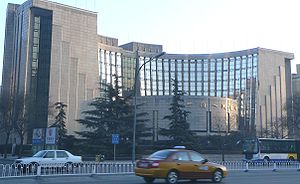Reserve Bank of Kirav
 Logotyp | |
| Headquarters | West Valēka, Kaviska |
|---|---|
| Established | 21106 |
| Ownership | Distributed |
| President | Xristína Tírestin |
| Central bank of | Kiravian Federacy |
| Currency | Kiravian saar (KSR) |
| Reserve requirements | 0 - 15% |
| Bank rate | 0.15% to 1.25% |
| Interest rate target | 0 to 0.25% |
| Interest on reserves | 0.25% |
| Interest paid on excess reserves? | Yes |
| Website | wwww.rbk.ār.kr |
The Reserve Bank of Kirav (Coscivian: Ğevmarésix Mēntiuv Kiravsk ) is the central bank of the Kiravian Federacy. It was formally created in 21106 by the Currency Moderation Act as part of the [thing going on at the time]. Over time, the roles and responsibilities of the Reserve Bank of Kirav have expanded, and its structure has evolved. Its responsibilities include conducting monetary and exchange rate policy, managing international reserves, and establishing, maintaining and regulating payment systems in the country. The Bank of Kirav is tasked by law to achieve and maintain price and financial stability, and has a mandate to use, by its own discretion, any policy instruments at its disposal to realise these objectives.
History
A monetary crisis happened. Government media and corporations lost their minds. Society feared this, so the RBK was established to oppress gamers in the financial sector. When established in 21106, the RBK was a government-chartered entity with capital contributed by the country's principal interstate banking groups.
During the Kiravian Civil War, the RBK's bullion reserves and other physical assets were moved several times to prevent them from falling into Socialist hands, and would ultimately be shuttled to Æonara for safekeeping. As the tide of the war turned in favour of the Socialists and Valēka came under threat, the Bank's headquarters staff were evacuated to Saar-Silverda and then to Æonara. With the expulsion of Federalist forces from the Mainland, the Kiravian Union set up a new, fully state-owned central bank, the People's Bank of Kirav, under the supervision of the Economic & Social Soviet.
The RBK would continue in exile as the central bank of the Kiravian Remnant and played an important role in stabilising the rump state's economy and financing its development.
Upon Kiravian reunification, the RBK's Control Commission took over direction of the People's Bank of Kirav in order to manage the currency merger and accomplish the phaseout of the former Kiravian Union currency in an orderly fashion. The RBK moved back into its Kartika offices in 1986 and opened a new West Valēka head office in 1991.
Organisation and Governance
The seven members of the Control Commission (Ārikorkirstuv) serve for staggered terms of 175 months, with one term beginning every 25 months. Full terms are non-renewable, but Commissioners appointed to fill a vacancy may be reappointed to serve a full term. Commissioners are selected by the Federal Council, and can be removed from office by the Federal Council for misconduct. Both selections and removals require the approval of a two-thirds majority of the Council. The President and Vice-President of the Control Commission are selected by the Council every 42 months, and Commissioners remain eligible for appointment and reappointment to these posts for as long as they remain on the Commission.
The Reserve Bank of Kirav has its main offices in the West Valēka canton of Valēka, where the Control Commission meets and most personnel are based. However, the Bank's official address is that of its Kartika offices in the city's E-District, where the federal government's accounts with the bank are handled.
Shares in the RBK are not transferable and cannot be used as collateral. The States of the Kiravian Federacy are the sole subscribers to and holders of the capital of the RBK.
Ownership
Today, RBK capital is about ◊11 billion, 50% of which is held by the Government of the Kiravian Federacy, and 50% by the governments of the several States of the Kiravian Federacy as shareholders. The states’ shares of the Bank's capital are calculated using a capital key which reflects each state's share of the total population and gross domestic product of the Federacy. The RBK adjusts the shares every ten years and whenever the number of shareholders changes. The adjustment is made on the basis of data provided by the Secretariat of the Exchequer. Currently, the largest state shareholders are Kaviska, Cascada, Devahoma, and the Sydona Islands. This ownership model was introduced with the XYth Amendment to the Kiravian constitution, which also granted the bank constitutional (rather than merely statutory) status. The XYth Amendment made subscription to the RBK's capital a duty of state governments and a requirement for the elevation of territories to full statehood or the admission of external entities as states. This requirement has deterred many Kiravian territories, especially the remaining territories in inland and northwestern Great Kirav, from seeking full statehood, as paying up their capital share would be prohibitively expensive for most.
Monetary Policy Role

Public-sector Banking
The Reserve Bank of Kirav provides accounts and performs normal banking services for the Federal Government and the non-state (e.g. territorial) federal subjects of the Kiravian Federacy, as well as for many state governments on a voluntary basis. Important governmental and semi-governmental organisations such as the Social Pension System, Federal Supplemental Health Endowment, Structural Adjustment Fund, and Kiravian People's Sovereign Wealth Fund also hold accounts with the RBK.
Currency Reserves
The RBK also holds substantial assets that are not specified in saars, including bullion reserves (in copper, gold, silver, platinum, iridium, and rhodium), monetary whiskey reserves, securities in foreign currency, credit with foreign banks, foreign exchange, and others. Currency reserves can be invested for profit and also provide a possibility of intervening in the market if the exchange rate fluctuates strongly.
In 21201, the RBK impanelled a study commission to investigate the potential value of accumulating cryptocurrency reserves. In 21204 the study commission recommended that the Bank not pursue this course of action.